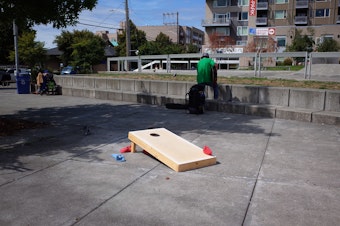Amy Radil
Reporter
About
Amy Radil is a reporter at KUOW covering politics, government, and law enforcement, along with the occasional arts story. She got her start at Minnesota Public Radio in Duluth, and freelanced for Marketplace and other programs from Rio de Janeiro, Brazil. Amy grew up in Omaha, Nebraska. She graduated from Williams College and the Columbia University Graduate School of Journalism.
Location: Seattle
Languages Spoken: English
Pronouns: she/her
Stories
-

Seattle Opera's Wagner Tubas: 'A New Sound We've Never Heard'
As German composer Richard Wagner contemplated the Ring cycle in the 19th century, he decided it wasn’t enough to create a four-night saga of gods and humans.
-

Seattle Parks District proposition ahead in Tuesday primary
Seattle’s Prop 1 is ahead 52.4 to 47.6 percent in Tuesday’s primary election totals. The measure would change the way park maintenance is funded. Supporters promise parks that are better maintained; opponents say accountability will be the challenge.
-

Seattleites: Good Luck Finding Legal Pot To Buy
After the hoopla settled down after the grand opening of Seattle’s first state-licensed retail marijuana store in July, pot aficionados found that retail stores were hard to find.
-
Marijuana Activists Cheer Federal Crackdown On Hash Oil Manufacturer
Two men who produced marijuana candy appeared in federal court Friday for a detention hearing . They’re accused of endangering others while manufacturing marijuana extracts.
-
Seattle Somalis Worry Arrests Could Hinder How They Send Home Money
A Somali immigrant living in Kent was arrested Wednesday on charges of fundraising for the Somali insurgent group Al-Shabaab. Her arrest could cast more suspicion on the system Somalis use to send money home.
-

Gourmet Marijuana Goodies Just Out Of Reach In Washington
State-licensed marijuana retail stores are just opening their doors in Washington and state regulators are still deciding what customers will find...
-

Taxi Drivers Balk As Mayor OKs More Rideshares
On June 16, Seattle Mayor Ed Murray announced that a stakeholders group had agreed to lift restrictions on the growth of rideshare companies. In...
-

Teary-Eyed Mayor Murray Declares 'Summer Of Safety'
In the wake of recent gun violence, Seattle Mayor Ed Murray said the city faces a crisis of confidence in public safety.
-

Pot Shots: How Marijuana Legalization Tore Apart The Seattle Police Media Unit
In March 2012, the Seattle Police Department made an unorthodox hire: Jonah Spangenthal-Lee, a former cops reporter who had worked at The Stranger and...
-

$15 Minimum Wage Law May Face Ballot Challenge
On Monday, June 2, Seattle workers and politicians ate cake and danced in celebration of the city's new minimum wage law. As the dance party ended, the...